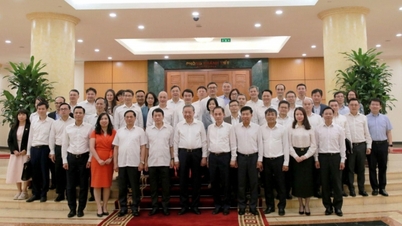Specifically, in an interview with Nikkei Asia , Scott Beaumont, President of Google's Asia- Pacific region, affirmed that the company is targeting this region with the explosion of generative AI.
Google has launched a beta version of a technology called “generative search experience” (SGE), which uses generative AI to improve the quality of Internet search services.
 |
| Google will focus on developing the generative AI market in the APAC region. |
India and Japan are the two markets that have just received access to this new Google technology, second only to the US. The company representative explained this because “the level of interest in these two countries is extremely high” compared to other global markets. In addition, South Korea is also a high-ranking Asian country on the demand list.
By the end of 2022, the APAC region contributed $47 billion in revenue to Alphabet (Google's parent company), accounting for 16% of the company's total global revenue. Meanwhile, revenue in Europe, the Middle East and Africa reached a total of $82 billion, accounting for 29% of global revenue.
Beaumont also emphasized that “more than half of the world's internet users are concentrated in the APAC region”, along with the economic growth of countries in the region, the increasing level of digital penetration creates huge “room” for growth.
With these factors, Google is aiming to expand all revenue sources in the Asian market, including cloud computing services, hardware sales such as smartphones along with online advertising.
Google executives have pointed out that generative AI could serve the Asian region as a “weapon” or “an assistant in your pocket.” There is huge demand from small and medium-sized businesses for this booming technology, with expectations of strong productivity improvements.
However, as for the Chinese market, Beaumont confirmed that there are no “consumer services” being deployed there and denied the possibility of participating in the potential AI market of the world's second economy.
“We have a lot of work to do in other markets,” Beaumont said, noting that the company will need to overcome “similar obstacles” in China in the area of generative AI.
In 2010, Google stopped providing search services in the mainland to protest Internet censorship and cyber attacks originating from China against the company.
Source





![[Photo] Cutting hills to make way for people to travel on route 14E that suffered landslides](https://vphoto.vietnam.vn/thumb/1200x675/vietnam/resource/IMAGE/2025/11/08/1762599969318_ndo_br_thiet-ke-chua-co-ten-2025-11-08t154639923-png.webp)





































![[Video] Hue Monuments reopen to welcome visitors](https://vphoto.vietnam.vn/thumb/402x226/vietnam/resource/IMAGE/2025/11/05/1762301089171_dung01-05-43-09still013-jpg.webp)




































































Comment (0)